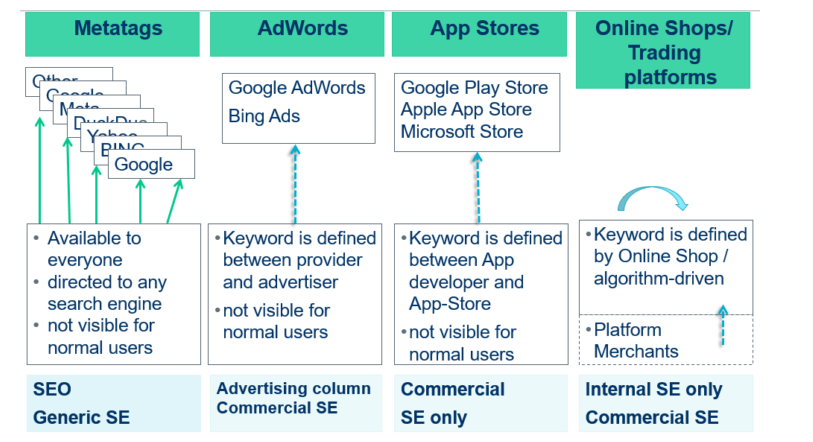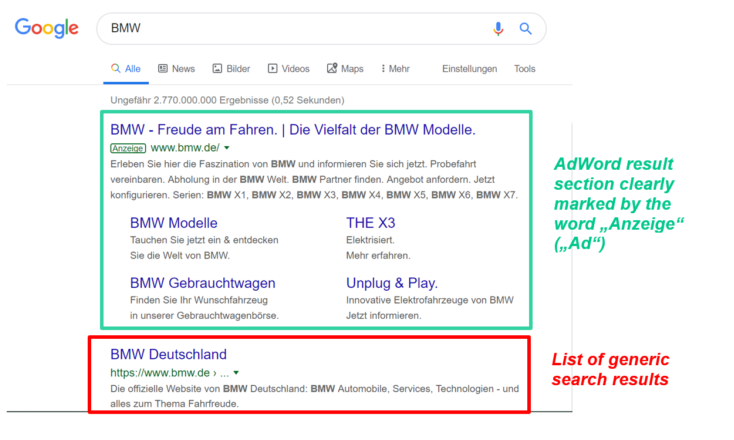The digital transformation of commerce in recent years has led to new online marketing opportunities for trademark proprietors. The use of your own trademarks in order to navigate the consumer through the internet to your products, for example by means of SEO (search engine optimization) and keyword advertising, has certainly become a very important marketing tool nowadays. One of the unspoken rules of competition is that the entrepreneur wants to also draw the consumer’s attention to his own products when the consumer is looking for a competing product. The question of the extent to which it is legally permissible to use a competitor’s trademark for one’s own online advertising has been largely clarified by German and European case law in the field of keyword advertising. However, there are still some legal pitfalls and recent developments to be considered:
What Do you need to know about trademarks when using them for online marketing?
Trademarks are distinctive signs to identify certain goods or services with the proprietor of the trademark. They protect the specific interests of their proprietor that is to ensure that the trademarks fulfil their economic and legal functions.
The function of indicating origin – namely the function of the trademark to guarantee the identity of the origin of the marked goods/service to the consumer by enabling him to distinguish them from others that have another origin (such as competitor’s products) – is the essential function of the trademark. Apart from this, there are a few other legally recognised functions of the trademark, such as the function of quality, the function of communication, the function of investment and the function of advertising.
General rule for legal use of foreign trademarks: when a third party uses a sign identical with your trademark in relation to goods/services which are identical with those for which that mark is registered (your products), you are entitled to prohibit that use only if it is liable to have an adverse effect on one of the functions of the mark, whether that be the function of indicating origin or one of the other functions. However, there are certain situations where a trademark proprietor cannot prohibit the use of his trademarks without his consent by a third party:
- a third party is a distributor or partner of the trademark proprietor and as such entitled to use the trademark in order to market the respective goods (licence);
- the goods have been put on the market under his trademark with his consent in Germany or in one of the other Member States of the EU and a third party has legally purchased those goods and is reselling them;
- a third party uses the trademark only as an indication of the intended purpose of a good, in particular as an accessory or spare part, or of a service in so far as the use is necessary therefor
and in all cases, as long as the use does not contravene accepted principles of morality or
- a competitor uses the trademark for a product comparison within the legal boundaries of comparative advertising (= a mere comparison of objectively verifiable product characteristics, without defaming or exploiting the good reputation of the competitor).
Generally, apart from these exceptions, a third party must not use a foreign trademark. However, when it comes to online marketing there are some exceptions to these rules as it offers the possibility to use foreign trademarks in a “hidden” way:
How to correctly use trademarks for online marketing?
Using trademarks (either third-party trademarks or your own) online ensures that potential future customers can find your products in the result list of the common search engines such as Google or Bing. There are basically four different situations in which trademarks can be effectively used as keywords and act as a “hidden navigator” through the online world:
- Metatags
- AdWords
- App Stores
- Online Shop and internal product search engines
It has to be noted that the trademark selected as a keyword is not visible to the consumer and is either defined by the advertiser in the source code of the company website (Metatag), or between the search engine provider (Google or Bing) and the advertiser (AdWords), or between the App Store provider and the advertiser (Keywords in App Stores), or it is defined by the provider of an online platform offering its own product search engine (such as Amazon or ebay). This is illustrated in the following graphic:
I. Metatags
Metatags are hidden keywords embedded in the source code of your website. They can be found by the search engine’s web crawlers that gather information from across hundreds of billions of web pages and organise it in the search index in order to then generate the search results of every individual search by a user. Metatags can be used by anybody to optimise the generic results of search engines and increase the website traffic.
What is permitted? The use of own trademarks as a metatag.
What’s not permitted? The use of third-party trademarks as a metatag in your web page (if no general exception applies as outlined above, e.g. when selling original goods or to tag legitimate comparative advertising with this third-party trademark).
It is important to note that metatags will only help to optimise the generic results generated by search engines, but not the commercially generated AdWord results. For example, the Google search differentiates as follows between the display of the generic result list and the clearly marked Ad sections:
II. Adwords
AdWords are paid keywords that are contractually defined between the provider of the search engine (such as Google AdWords or BingAds) and the advertiser. The advertisers can pay to be displayed in clearly marked sections (“Ad”/”Anzeige”) of the result page as shown above.
What is permitted?
The use of your own trademarks as keywords;
the use of protected third-party trademarks as keywords is – if not already allowed according to the general exceptions as outlined in the beginning – generally permitted as long as:
- the protected trademark is not used in the AdWord-Ad or in the displayed domain (advertising link) or in the actual target domain,
- the advertiser is clearly identified,
- the advertising block is clearly separated from the list of the generic search results,
- the Ad itself is not merely generic or does not constitute a likelihood of confusion.
III. App Stores
In App stores such as Google Play Store, Apple App Store or Microsoft Store, the App developer can also contractually define certain keywords that are not visible to users, but will guide them find his App among other results in the stores. The legal situation is not finally clear yet, but some courts applied the principles of the AdWords case law also in this case. Please note that, in the past, the App Stores did not distinguish between a paid advertising section and a “simple” result list, because there are no generic search results within the App Store search engine. If you search for an App name, all Apps uploaded to the store will be crawled.
Based on that background, under the German law regime, it is permitted to use a competitor’s trademark as a keyword in the App Store, but only if:
- The use is no targeted impairment of the third party trademark proprietor and
- the search results are not influenced in such a way that the own app is always listed before the one of the competitor although the competitor’s trademark was entered in the search box (and it is thereby always pushed to the second place of the result list).
However, this situation is not to be confused with the fact that Apple has recently implemented the so-called “Apple Search Ads” that are paid Ads allowing your Ad to be placed at the top of result results and marks them by the term “Ad” as follows:
Those Ads are generated based on the keyword defined by the advertiser and entered by the user on the one hand and Apple’s collected information about the iPhone user on the other hand. Legally, it is very likely that the principles of the AdWords case law will also apply in the case of use of a foreign trademark for the “Apple Search Ads”, but it remains to be examined by the courts if this is permitted under certain requirements.
IV. Online Shops and Internal Search Engines
Internal search engines such as the Amazon or the ebay product search allow searching within the market place or shop for products matching the search terms. The keywords are either defined by the online shop itself or by its algorithm. Therefore, the display of third-party products – in addition to those of the sought-after branded products – is not based on the behaviour of the competitors, but on the evaluation of customer behaviour by the marketplace operator.
The question of whether it establishes a trademark infringement when the internal search engine displays search results containing the sought-after branded products and also similar competitor products, has to be decided individually for each single case. So far, the German Federal Court gave general guidance that the principles of keyword advertising are applicable and that it is relevant to look at the customer perception when he is confronted with the contested result list. Therefore, it must be examined whether an average Internet user cannot or only with difficulty recognize whether the goods advertised in the list of results in question originate from the trademark proprietor or a company economically associated with him or, on the contrary, from third parties. If the customer gets confused, such display of third party offers is not permitted.
To conclude, the modern age of digitalisation did not just bring new legal questions about online trademark infringements, but also new possibilities for online marketing and legalized to a certain extent the use of competitors protected signs for your own business objectives. The further progress of digitalisation will certainly continue to challenge the legal limits of the online use of trademarks in the future.



